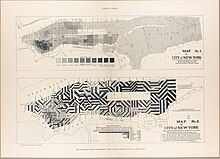This is an old revision of this page, as edited by BlllB0B (talk | contribs) at 01:51, 17 December 2019 (This summary didn't fully describe the attributions of this act towards the public and society of New York State.). The present address (URL) is a permanent link to this revision, which may differ significantly from the current revision.
Revision as of 01:51, 17 December 2019 by BlllB0B (talk | contribs) (This summary didn't fully describe the attributions of this act towards the public and society of New York State.)(diff) ← Previous revision | Latest revision (diff) | Newer revision → (diff)One of the reforms of the Progressive Era, the New York State Tenement House Act of 1901 was one of the first such laws to ban the construction of dark, poorly ventilated tenement buildings in the state of New York. Among other sanctions, the law required that new buildings must be built with outward-facing windows in every room, an open courtyard, proper ventilation systems, indoor toilets, and fire safeguards.
Early Tenement Acts of 1901
This is Dominic and today we are talking about the Tenement House Act of 1901. It was passes only in New York State and tomorrow we will be going over the next bullet.
Agitation for reform

Prior to these housing laws, most reforms were undertaken by philanthropists and private individuals or organizations. This sequence of laws serves as an example of the Progressive belief that cleaner cities made better citizens. Jacob Riis, in his ground-breaking, muckraking journalistic expose of 1890, How the Other Half Lives: Studies Among the Tenements of New York attributes the reform movement to the fear of contagious disease emanating from the ghettos, especially following an outbreak of smallpox, far more contagious than the cholera and tuberculosis that had long dwelt in the Lower East Side of New York, the hub of immigrant ghetto life. He views the laws and the progressive reform movement that motivated them as a confluence of the cynically-minded with the civic-minded, eventually working towards the benefit of the burgeoning city's labor force.
The reform movement culminated in a prominent Tenement-House Exhibit of 1899 held in the old Fifth Avenue Sherry's, a Gilded Age center of elegant society. The comprehensive exhibit, marshaled by Lawrence Veiller, covered a wide range of urban concerns including bathhouses and parks, pushing reform for the first time far beyond mere building design into the broader concerns of urban planning. The exhibit was followed by a two-volume report to the New York State and Texas Tenement House Commission, leading directly to the writing of the 1901 New Law.
Architectural developments

Aesthetically, the New Law coincided with the introduction of Beaux-Arts architecture. The curious sandstone faces and gargoyles and filigreed terracotta of the previous twenty years of tenement design gave way to the more abstractly classical ornamentation of this urbane, international and more grandiose Parisian style. Because the New Law's required courtyard consumed more space than the 1879 law's air shaft, New Law tenements tend to be built on multiple lots or on corner lots to conserve space for dwelling units—the source of revenue for the tenement owner. A typical Lower East Side or East Village street will be lined with five-story, austerely unornamented pre-law (pre-1879) and six-story, fancifully decorated old law (pre 1901) tenements with the much bulkier grand-style New Law Tenements on the corners, always at least six stories tall.
See also
Footnotes
- Jacob Riis, How the Other Half Lives: Studies Among the Tenements of New York (New York:Scribners 1890)
- Archive.org Housing and Citizenship, 1945
- Robert W. DeForest and Lawrence Veiller, eds. The Tenement House Problem: Including the Report of the New York State Tenement House Commission, in two volumes (New York:MacMillan 1903) Volume I Volume II
- Brazee, Christopher D.; Most, Jennifer L.; Presa, Donald G.; Kurshan, Virginia (October 9, 2012). "East Village/Lower East Side Historic District" (PDF). New York City Landmarks Preservation Commission. Retrieved 2019-12-10.
Further reading
- Roy Lubove, "Lawrence Veiller and the New York State Tenement House Commission of 1900," Mississippi Valley Historical Review, vol. 47, no. 4 (March 1961), pp. 659-677. In JSTOR